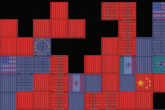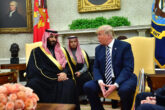March 09, 2020
Could the U.S. Sanction the International Criminal Court?
The International Criminal Court’s (ICC’s) March 5 decision to authorize its top prosecutor, Fatou Bensouda, to pursue an investigation into alleged U.S. war crimes in Afghanistan has already triggered a new round of U.S. tensions with the court. Secretary of State Mike Pompeo quickly denounced the ICC’s action and stated that the U.S. “will take all necessary measures to protect our citizens from this renegade, so-called court.” Trump administration officials will now have to decide whether or not to follow through on the public threat that then-Trump administration National Security Adviser John Bolton made in 2018 to sanction ICC officials and staff if they pursued an investigation into the U.S.—and, if so, what legal authorities they could use for such sanctions.
The U.S. has never joined the ICC and has long opposed ICC investigations of Americans, which U.S. officials view as inconsistent with the ICC’s jurisdiction and mandate. But the current U.S. tensions with the ICC date to late 2017, when Bensouda first announced her intention to investigate alleged war crimes in Afghanistan, which is an ICC member, and that the investigation would include alleged U.S. war crimes as well as war crimes perpetrated by the Taliban and Afghan government. U.S. officials have threatened a steadily escalating set of consequences against the ICC if it pursued the investigation against U.S. service members. Indeed, the State Department already revoked Bensouda’s ability to travel to the U.S. in April 2019, several months after she announced her intention to launch a preliminary investigation into U.S. actions in Afghanistan. Now, the U.S. faces the question of whether to sanction the court, an act that the Trump administration has the legal authority to do, but that would likely trigger a backlash by U.S. allies that would far outweigh any perceived benefits from sanctions.
Read the full article in Lawfare.
More from CNAS
-
Game Over?
The trade wargame suggests that sustained high tariffs could create leverage and urgency to spur action toward a productive restructuring of the international trade system....
By Emily Kilcrease & Geoffrey Gertz
-
Middle East Security / Energy, Economics & Security
Trump Inks $600 Bn Deal In Saudi Arabia | Musk, Blackrock CEO Flank Trump In Gulf VisitIn today's episode of India Global, U.S. President Donald Trump secured a $600 billion commitment from Saudi Arabia on Tuesday to invest in the United States. NDTV's Gaurie Dw...
By Daniel Silverberg
-
Energy, Economics & Security / Technology & National Security
Tariffs and Tech: An Uncertain RecipeHigher tariffs could prompt American cloud companies to shift more of their capital investments abroad....
By Pablo Chavez
-
Trump Tariffs: How Will U.S. Plans Reshape the Global Economy?
Donald Trump says he's already decided the tariffs he will impose on countries that export goods to America, including the United Kingdom. Channel 4 hears from Emily Kilcrease...
By Emily Kilcrease




